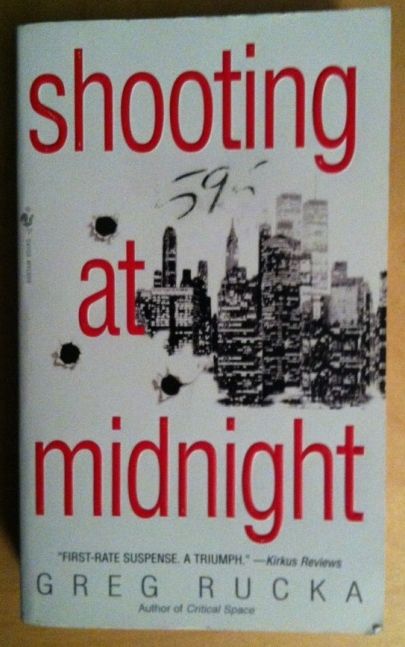Or why you should read Shooting at Midnight by Greg Rucka
Shooting at Midnight is the fourth book in the Atticus Kodiak series of books... kind of. The book stars Bridgett Logan, a badass private detective with a chip on her shoulder who is a sometime love interest of Mr. Kodiak, as she is dragged into the darkest cesspools of her past. In the novel, Bridgett is approached by a friend from her past with a single request: to help her kill her abusive, drug dealing ex-boyfriend. Bridgett agrees to help, setting off a chain of events that drags her into the track-marked underbelly of the heroin trade and pits her against one of New York's biggest druglords.
Shooting at Midnight is distinct from the rest of the Kodiak series for reasons beyond the change in protagonist; it is more of a crime/noir piece than a suspense thriller. Instead of grand action set pieces arranged with engineered precision, we have a much more intimate, slow moving beast. It's a book that grabs you and drags with it as it creeps into ever darker recesses of the human experience; a book that slowly grinds down its characters as it progresses to its brutal conclusion. As a result, Shooting at Midnight is everything I want from a Noir experience: it's relentless, and desperate, and disgusting and filled with human drama. It's horrible and great and I couldn't put it down.
But I think that description still misses the spark of what makes the book more than just a superbly executed noir piece. I have a friend much smarter than me who argues that fiction is essentially an empathy engine. It grabs us as readers and allows us to see inside someone else's mind and to experience life from another perspective. And in living as this other person we learn to relate to them and care for their needs and viewpoint. It's a kind of magic. The best fiction makes us live with, understand, and empathize with people very different from us while still telling a compelling and entertaining/fascinating story. I think Shooting at Midnight is an example of this kind of fiction.
Let me explain. A lot of Shooting at Midnight is constructed around the heroin trade and drug addiction. Frankly, I find hard drugs disgusting and addiction to be one of the most alien and terrifying aspects of being human. I genuinely cannot fathom an all consuming need for something that so completely derails a person's priorities and life. I'm not sure anyone who hasn't experienced it can really understand it. Add the fact that, while my heart certainly goes out to them, most of my interactions with the drug addicts in my community are fairly unpleasant and I have a difficult time empathizing with them. (Also, despite thinking that way more should be done to help addicts and thinking criminal prosecution of users is counter productive and kind of a shitty thing to do, I can't quite shake that little voice that blames addicts for trying drugs in the first place... I mean, I know social pressures and cycles of poverty certainly play a tremendous role in drug addiction, but I know too many people who have escaped abuse and poverty cleanly to believe it's a zero sum game free of culpability.) I think one of the most powerful aspects of Shooting at Midnight is that it manages to drag me into this world in a really effective way that makes me relate to and approach an understanding with a group of people whose lives are so foreign to my own. It broadens my worldview a bit and makes me question my preconceived notions. And that is a kind of magic.
(Also, the prelude to this book is fucking brilliant. It's five pages that tells you who the protagonist is and seamlessly establishes the contract of the novel. It's also an absolutely gutting bit of prose.)
(Also, also, Shooting at Midnight, as a pun, is just black as hell.)

No comments:
Post a Comment